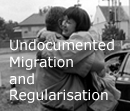Undocumented Migration and Regularisation

Regularisation, or the legalisation of the irregular status of immigrants under the law, is both a practical solution to illegal migration and one of the most controversial means of migration management as it weakens the power of the state to control the migration flows on its territory. There are many kinds of regularisation and it can involve different groups of migrants. One can distinguish between general regularisations aimed at all migrants without legal residency, and special regularisations which are intended only for a specific group of migrants. Countries which have carried out regularisation in the past (such as Italy, Greece, Great Britain, Portugal and Spain) chose either an amnesty for all asylum seekers or an amnesty for irregular migrant workers. Regularisation is a topic of discussion all over Europe. We would like to contribute to starting the debate about regularisation in the Czech Republic.
Marie Jel?nkov? is the coordinator of the theme. Contact: (migrace(at)mkc.cz)
This e-platform was established as a part of the project Regularization as One of the Tools for the Fight against Irregular Migration which is financed by European Social Fund through Operational Programme Human Resources and Employment. Partner of the projects are Association for integration and migration, the Organization for Aid to Refugees and the Multicultural Centre Prague, SOS Racismo-Mugak a Solidariedade migrante.
Photo by Vladim?r Krynytsky